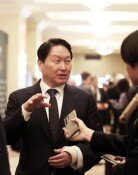Japans Chief Cabinet Minister Stresses Bilateral Ties
Japans Chief Cabinet Minister Stresses Bilateral Ties
Posted November. 16, 2010 11:23,
Japanese Chief Cabinet Secretary Yoshito Sengoku attended the summit Sunday between President Lee Myung-bak and Japanese Prime Minister Naoto Kan.
Sengoku also appeared at a signing ceremony between the foreign ministers of the two countries on the return of Korean books looted by Japan in its 1910-45 colonial rule of the Korean Peninsula.
It is very unusual for Japans chief Cabinet secretary to attend both of the events, which are commonly hosted by Japan`s prime minister or foreign minister, and for the venue to be Yokohama.
When Japans prime minister is out of Tokyo, the secretary as the No. 2 man in Japans Cabinet usually stays in Tokyo in case of emergency. So the absence of both the prime minister and chief secretary in Tokyo is considered unusual.
The extraordinary situation is attributable to Sengokus interest in Korea. Suggesting he would attend the summit, he told a news conference Friday that it was necessary to make an accurate judgment of what was discussed at the Korea-Japan summit by attending it because strengthening a future-oriented Seoul-Tokyo relationship is an important task.
Sengokus attendance at the summit is a hot topic among Japanese media because he is a powerful man in the ruling Democratic Party of Japan, who calls the shots in Tokyos domestic affairs and foreign policy. His departure from Tokyo to attend the Korea-Japan summit drew extensive coverage.
Sengoku has a strong recognition of history. He led left-wing student movements in the 1960s and has publicly acknowledged that Japans past imperialistic aggression damaged its neighbors.
He is also a politician with good knowledge of Korea and a positive stance toward resolving contentious issues with Seoul, including history, the return of cultural relics Japan looted in the colonial era, and the repatriation of the remains of Koreans forced to work for Japan.
Sengoku also said Japan can win global respect only when it rectifies its past history. He played a leading role in Kans Aug. 10 statement apologizing for Japans annexation of Korea in 1910.
The prime minister`s statement also had Japan pledging to return the old Korean books. Sengoku had good reason to attend the signing ceremony even at the risk of breaking a time-honored Japanese political practice because the event symbolized historic reconciliation between the two countries.
Because of Sengokus role in the agreement, President Lee thanked him in person after the ceremony.
jkmas@donga.com







